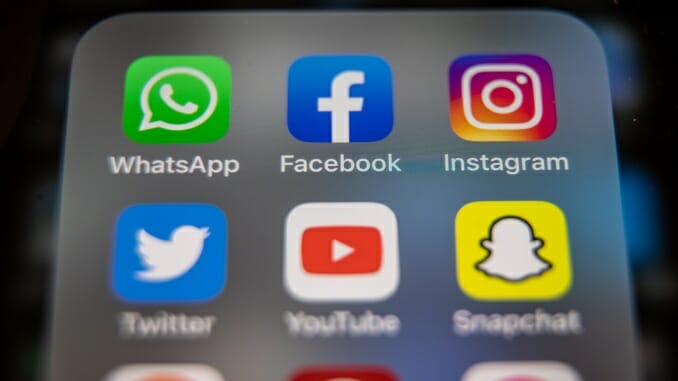Russia’s Instagram, Facebook Bans Are Only One Step In Building a ‘Digital Iron Curtain’ Amid Ukraine Conflict
Image via Matt Cardy/Getty Images
The landscape of the conflict borne from Russia’s invasion of Ukraine continues to change on a daily basis. As Ukrainian military forces and citizens fight and flee from Russian forces, world governments and major corporations responded with financial repercussions: sanctions, shutting down services, freezing assets and pulling business from the region. The Russian economy is cratering as a result. The Moscow Stock Exchange remains closed for the third straight week and Russian President Vladimir Putin admitted publicly that unemployment and inflation are likely to rise despite his claim that the “economic blitzkrieg” by Western nations was a failure.
Questions remain about how much these measures will actually affect Putin and the web of billionaire oligarchs who live at the front of foreign thought on Russia, but there is little doubt about their effect on Russian citizens, many of whom oppose the war in Ukraine. Thousands of Russians protested the invasion in cities across the country, Russians living abroad spoke out against Putin and social media platforms empowered both communities’ messages to spread.
These actions sparked a reaction from the Kremlin to control the market of information. New laws with stricter punishments for protestors and people using “war” to describe the war in Ukraine were passed. Access to non-Russian state news coverage of the conflict was severely limited. Then the hammer came down: Russia limited access to Twitter and banned Facebook and Instagram in recent weeks.
According to Motherboard, what is being labeled the “Digital Iron Curtain” is a suspected effort to centralize Russian social media users to platforms that can be more easily monitored by the Russian government. The key services that remain fully operational in the nation are WhatsApp, Telegram and VK. Of those, two offer end-to-end encrypted messaging that provide some protection against government surveillance, while VK is outright owned and operated by the Russian state. “You can assume that anything that happens on VK is absolutely not safe from the Kremlin,” Eva Galperin, EFF cybersecurity director, said.
But the protections offered by WhatsApp and Telegram aren’t foolproof. Banning WhatsApp remains on the table due to attempts by the Russian government to designate its parent company, Meta, as an extremist organization. That decision and the bans on Facebook and Instagram came after Meta relaxed guidelines on the platforms to allow users to call for violence against Russian soldiers. WhatsApp remains operational now, but the platform is making sure that users in Russia and Ukraine know how to protect their communications. In a series of tweets, WhatsApp encouraged users in the region to enable two-factor authentication and fingerprint lock while promoting tools like Disappearing Mode and View Once as ways to protect sensitive messages and images sent via the app.
-

-

-

-

-

-

-

-

-

-

-

-

-

-

-

-

-

-

-

-

-

-

-

-

-

-

-

-

-

-

-

-

-

-

-

-

-

-

-

-








































